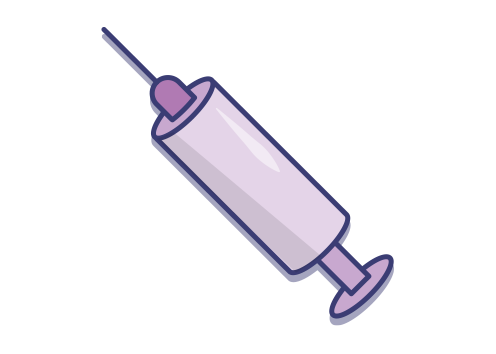
What types of infections can I get after having sex?
Infections can be caught through vaginal, oral and anal sex, as well as skin-to-skin contact. You are most at risk if you have had sex without a condom, but it is still possible to get an infection when a condom has been used so it is a good idea to get tested with any new partner(s). Click on the names of each infection below to find out more.
Not sure when to test for an infection?
If you have any symptoms, you should arrange a telephone consultation as soon as possible. See here for information on getting an appointment.
If you have no symptoms, then:
- 2 weeks following sex to test for Chlamydia and Gonorrhoea.
- 45 days following sex to test for HIV.
- 3 months following sex to test for Syphilis or Hepatitis.
Order an online test kit if you don’t have any symptoms.
Results
Please see our Results page for information on how to get your results.
What if I am a contact of an infection?
See our Contacts of an infection page for more information.

Swab and urine tests
- Chlamydia and Gonorrhoea
Chlamydia and Gonorrhoea are common sexually transmitted infections, caused by bacteria. Most people who have the infections will not have any signs or symptoms. Both can be cured with antibiotic treatment.
Symptoms may include:
- Pain or discomfort when urinating
- Discharge or irritation from the genitals or bottom
- In women: bleeding during or after sex, or between periods.
- Pain in your lower abdomen
These infections are both routinely tested for and offered to everybody. They are both tested for in the same test, with a urine sample or using a cotton-tipped swab. Sometimes this can be done yourself, but if you have symptoms this may be taken by the doctor or nurse during your examination.
Results are usually available within 7 days.
For more information on vaginal discharge, click here.
- Mycoplasma genitalium
Mycoplasma genitalium is a common sexually transmitted infection, caused by a bacteria. Most people who have the infection will not have any signs or symptoms, and many people clear the infection themselves without any treatment.
Symptoms can include pain or discomfort when passing urine.
If you have symptoms which the doctor or nurse think are due to Mycoplasma genitalium, it can be cured with antibiotic treatment. It is tested for using a cotton-tipped swab.
Results for Mycoplasma genitalium can take up to 3 weeks.
- Trichomonas vaginalis (TV)
This is a tiny parasite that can be passed on during sex.
Symptoms include unusual vaginal discharge or irritation.
It can be cured with antibiotic treatment. We can easily test women for it with a cotton swab. Men may be offered a urine test under some circumstances.
You will be offered this test if the doctor or nurse thinks that your symptoms might be caused by TV.
Depending on the test, results can be given on the day, or within 7 days.
For more information on vaginal discharge, click here.
- Herpes simplex virus (HSV)
This is the common cold sore virus.
It is transmitted by skin-to-skin contact. It can cause painful blisters or ulcers in some people, in others they may have no symptoms at all.
It is tested for on a swab taken from a sore area. The symptoms of herpes can be treated with antiviral medication, if needed. There is not a cure for the virus.
You will be offered this test if the doctor or nurse thinks that your symptoms might be caused by the virus. It is not a routine test. We cannot test for herpes if you do not have symptoms.
Results for this test usually take up to 2 weeks.
Further information about herpes may be found at the Herpes Viruses Association website: www. herpes.org.uk
- Bacterial vaginosis (BV)
Bacterial vaginosis is a very common condition which develops when the normal environment of the vagina changes. Symptoms are often an unusual vaginal discharge. 1 in 3 women will get it at some time.
It is not a sexually transmitted infection but can develop after you have had sex.
It is tested using a swab and a microscope. Results are usually on the same day.
You will be offered this test if the doctor or nurse thinks that your symptoms might be caused by BV. It is not a routine test.
For more information on vaginal discharge, click here.
- Candida (Thrush)
Thrush is caused by an overgrowth of yeast and can cause symptoms in women and men.
It is not a sexually transmitted infection.
It is detected on a swab test. It can be treated with antifungal treatments.
You will be offered this test if the doctor or nurse thinks that your symptoms might be caused by thrush.
Results are usually on the same day.
For more information on vaginal discharge, click here.

Routine Blood Tests
- HIV
Human Immunodeficiency virus (HIV) is most commonly passed on through unprotected sex. It can also be transmitted by coming into contact with infected blood – for example, sharing needles to inject steroids or drugs. It is a virus that affects the immune system over time.
Many people with HIV feel well and do not know they have the infection. It is treatable, but not curable.
It is important to test for HIV even if you don’t think you are at risk as there are very good treatments available for people with HIV infection.
This is a routine test offered to everybody.
Results are usually available within 2 weeks.
Some people may be advised to do a point-of-care test which gives a result in 20 minutes from a finger-prick test. This can be less accurate, so is not offered to everyone.
- Syphilis
This infection is caused by a bacteria. It can be passed on through unprotected sex. The symptoms can be difficult to recognise, but can include an ulcer, a rash on your torso, hands or feat, or painless lumps around your genitals. It can be cured with antibiotic treatment.
It is important that syphilis is treated, as it can have serious long term health problems.
This is a routine blood test offered to everybody, usually taken from your arm.
Results can take between 3 weeks.
- Hepatitis A
Hepatitis A is a virus and affects the liver. It is passed on through contact with infected faeces- through oral and anal sex, as well as contaminated food and water.
It is not a common infection in the UK but certain groups are more at risk of coming into contact with it. It is not a routine test. Treatment is a course of antiviral therapy though a dedicated Hepatology team.
Test results can take up to 3 weeks.
There is a vaccination that can prevent against this infection. You will be offered vaccination if you are thought to be at risk of Hepatitis A.
- Hepatitis B
Hepatitis B is a virus and affects the liver. It is passed on through unprotected sex.
It is not a common infection but certain groups are more at risk of coming into contact with it. It is not a routine test. Many people can clear Hepatitis B without ever knowing they had it.
Test results are usually abailable within 3 weeks.
There is a vaccination that can prevent against this infection. You will be offered vaccination if you are thought to be at risk of Hepatitis B.
- Hepatitis C
Hepatitis C is a virus and affects the liver. It is passed on by blood-to-blood contact – commonly by sharing injecting equipment or through certain types of sex (unprotected anal sex, fisting, sharing sex toys).
Without treatment, most people with hepatitis C can’t clear it, and they stay infectious to others.
There is no vaccine against hepatitis C.
You will be offered a test if you are thought to be at risk of Hepatitis C.
Test results can take up to 3 weeks.

Other infections that may be diagnosed on the day
- Non-specific urethritis (NSU)
Non-specific urethritis (NSU) is inflammation of the urethra, which is the tube that urine comes out of. There are many different causes, ranging from STIs to a reaction to soaps or a non-STI bacterial infection. We look for signs of urethritis by taking a sample from the hole at the end of the penis (the meatus) and looking for signs of inflammation under the microscope.
It can also be called non-gonococcal urethritis (NGU).
You will be offered this test if you have certain symptoms (such as a discharge or pain passing urine) and if your urine test has been reported as negative for chlamydia and gonorrhoea.
It is treated with antibiotics and you may have further tests sent to look for other causes.
Some men develop the above symptoms, but do not have an infection or any inflammation found. Sometimes this can be caused when there is anxiety about having caught a sexually transmitted infection. This anxiety causes the pelvic floor muscles to become tense.
Please see our Patient Information Leaflet below “What if my tests for urethritis are negative?” for more information.
- Pelvic inflammatory disease (PID)
PID is an inflammatory condition affecting the uterus (womb), fallopian tubes and, occasionally, the ovaries.
It is usually caused by a bacterial infection, some of which are caught through sex. It can take weeks or months before symptoms develop.
Symptoms include lower abdominal pain, pain during sex, unusual discharge or vaginal bleeding.
There is no specific test for PID. Diagnosis is made by an internal examination by a doctor or nurse.
PID is treated with a course of antibiotics. Your partner(s) should also be treated to stop any infection being passed from one to another.
Most women with PID recover completely, especially if treated early. If left untreated, PID can have serious complications including pain, infertility and ectopic pregnancy.
See our patient information leaflet below for more information.
- Pubic lice
Pubic lice are small parasites that live in human hair, usually pubic hair. They can’t jump between people and are only transmitted through direct skin-to-skin contact.
It can cause itching. You may notice lice or eggs on your hairs.
These are usually treated with over-the-counter creams.
- Scabies
Scabies is caused by small parasites that make their way under the skin and can be passed on through close contact, or from infected clothing, towels or bed sheets.
They can cause severe itching on multiple parts of your body and can cause a rash which can look similar to eczema.
Scabies is treated with over-the-counter creams.
- Genital warts (HPV)
Genital warts are caused by the human papilloma virus (HPV). The virus causes the warts to appear in only a small minority of people. This means the majority of people who have been infected with HPV do not develop warts.
Genital warts may either be left alone, or can be treated, to try and clear the lesions. It is important to understand that treatment is for cosmetic purposes only and treatment does not clear the virus – only the warts. The virus tends to resolve on its own over months or years.
Treatments include:
- Cryotherapy (cold spray of liquid nitrogen done by a doctor or nurse)
- Skin creams or solutions which you can use at home
- Molluscum contagiosum
Molluscum are caused by a virus. The virus causes the bumps to appear in only a small minority of people. It is a harmless condition, and usually resolves on its’ own in a few months. The virus is passed on through skin-to-skin contact.
Molluscum may either be left alone, or can be treated, to try and clear the spots. It is important to understand that treatment is for cosmetic purposes only.
Treatments include:
- Cryotherapy (cold spray of liquid nitrogen done by a doctor or nurse)
- Skin creams which you can use at home
- Chronic Pelvic Pain syndrome (CPPS)
Chronic pelvic pain syndrome (CPPS) can develop in both men and women. At Unity sexual health we run a specialist clinic for men who have persistent genital symptoms. Women with persistent pain may be referred to Gynaecology for further assessment.
CPPS is an ongoing (persistent) discomfort or pain you may feel in your pelvic region- mainly affecting the tip of the penis and/or the testicles and/or the anus (back passage).
Please see the following Patient Information Leaflets below for more information:
What if my tests for urethritis are negative?
Chronic Pelvic Pain Syndrome (CPPS)
Pelvic Floor Muscle relaxation
You can find further information on these infections on the following websites and leaflets:

